Law & Order: Special Victims Unit: An Oral History
"We’ve had some good times in the morgue."
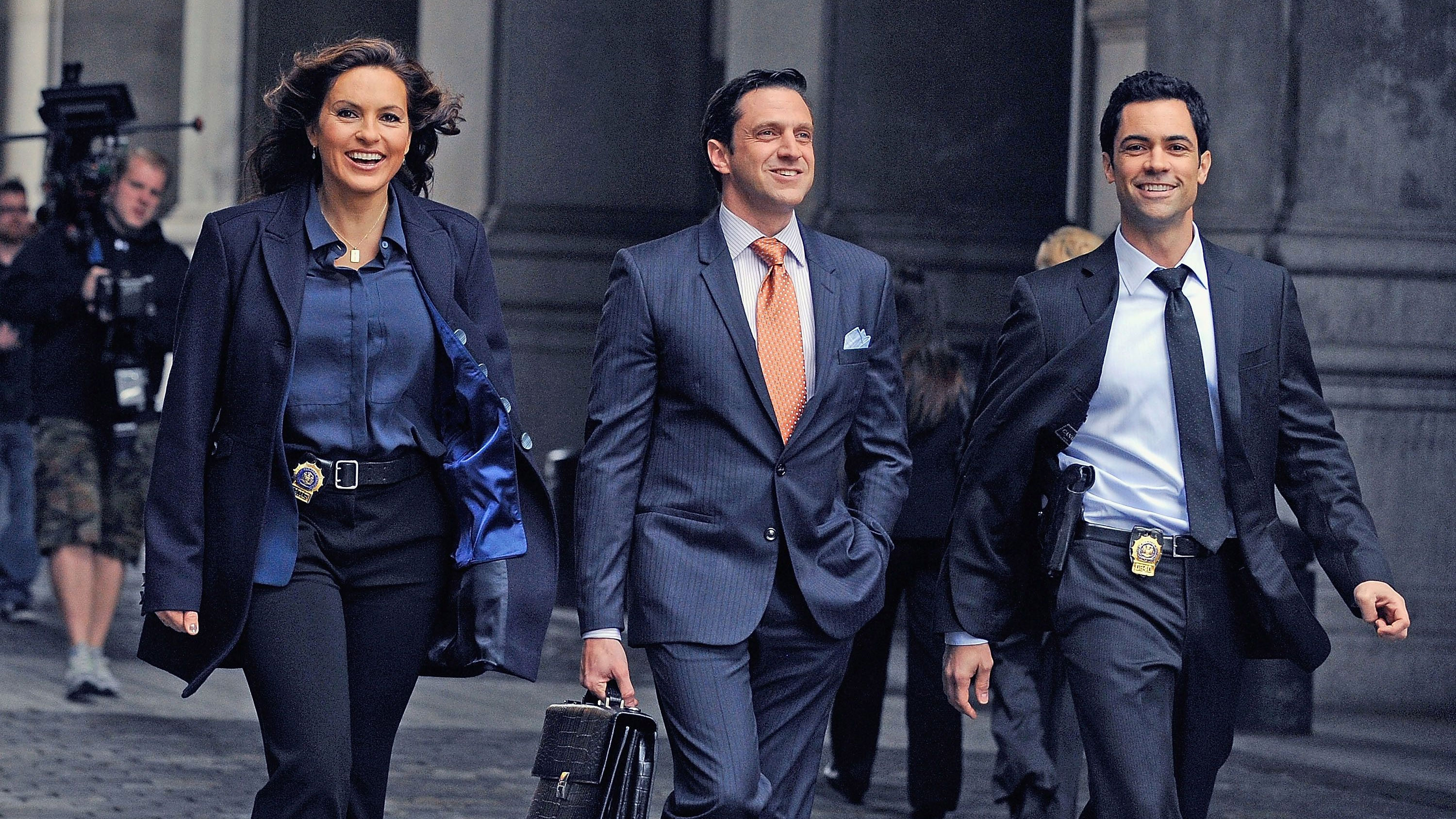
In 1999, creator Dick Wolf’s procedural crime franchise Law & Order debuted a spin-off centered on a squad of NYPD officers who investigate sex crimes. Law & Order: Special Victims Unit, or SVU as it became known, featuring topical story lines, shone a light on violence against women—and often saw justice served. It was a runaway hit and remains one of NBC’s most watched shows, with as many as 10 million viewers tuning in weekly.
Now, as the series enters its 20th season—tying with Gunsmoke and the original Law & Order for longest-running drama series in TV history—the female cast and crew who have been key to its success share how it all came together. These are their stories. *DUN DUN*
Getting The Gig
Judy McCreary, co-executive producer: When executive producer Peter Jankowski reached out to me about SVU, I kept calling it “SUV.”
Isabel Gillies, Kathy Stabler: 20 years later, I still call it “SUV.” [Laughs]
Mariska Hargitay, detective Olivia Benson: I had just come off filming ER and was working on a development deal with another network when my agent called me and said, “I don’t know if it’s up your alley, but I’d like you to read this.” I read the script, and I was absolutely done. I didn’t know a lot about sexual assault or domestic violence back then, but I knew I’d never connected to a script more. I felt the part in my soul. When I went in to read for Dick, I saw other actresses in the waiting room, and I told him, “I need you to understand, this is my role.”
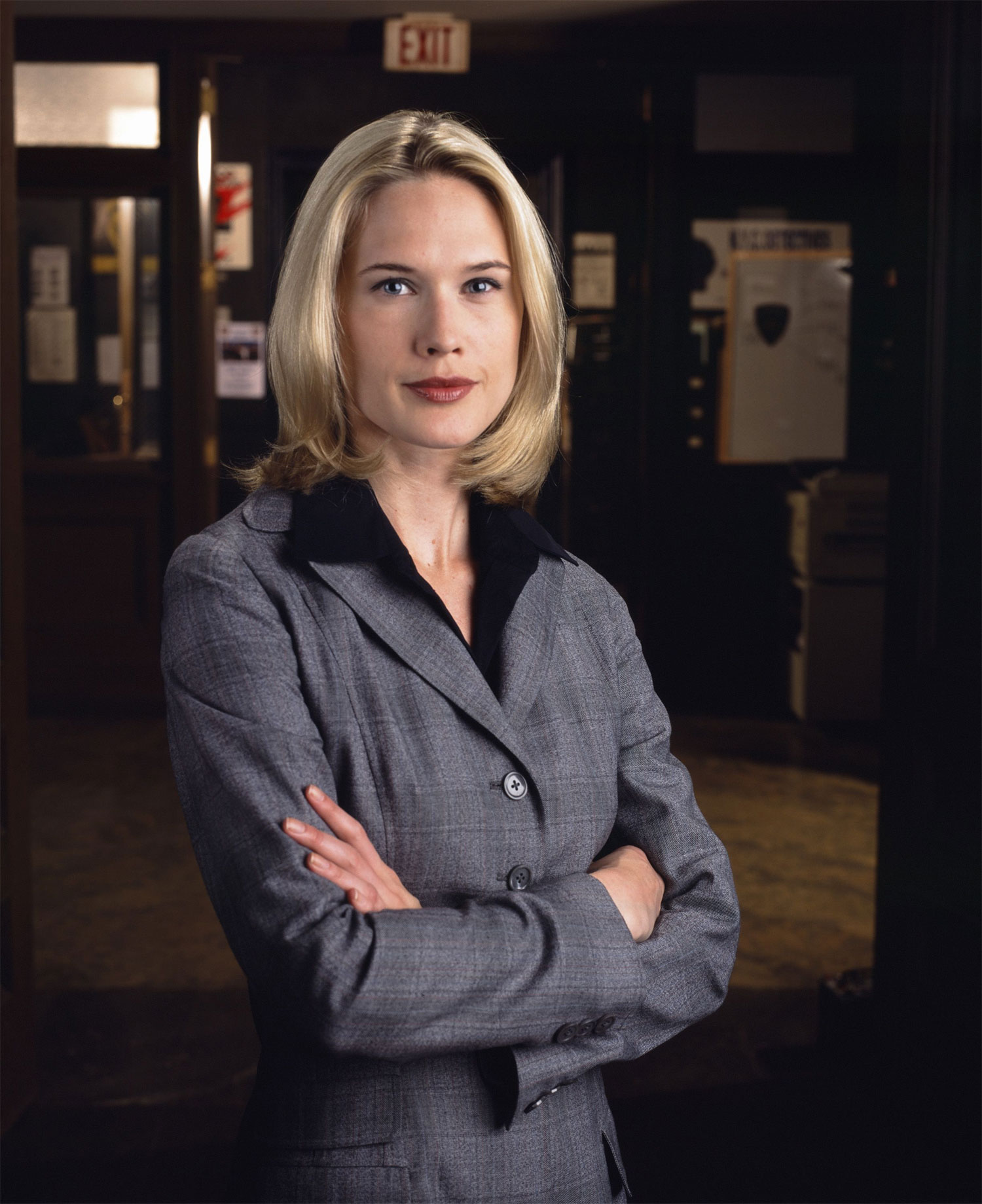
Stephanie March as D.A. Alex Cabot.
IG: For New York actors, working on Law & Order is a little notch in your belt. I’d just finished an arc on the mothership when I went out for [detective Elliot] Stabler’s wife, Kathy. It wasn’t the biggest part, but I really felt it. I’m from New York, Kathy’s from New York. I told Dick Wolf, “You know, I’ve auditioned for you a lot. You should just give this to me.”
Tamara Tunie, medical examiner Melinda Warner: I was actually working on something else the day of the audition, but I told my agent, “Look. I’ve done every Dick Wolf show in New York. Come on. They know me.” And I got the job. I loved Warner, I loved how smart she was, and I loved doing research for the role. I met with a medical examiner, and I got my own medical dictionary. The showrunner at the time, Neal Baer, was a doctor, so I could always go to him with questions. But besides that, most of my knowledge of the physical makeup of the human body was from ninth-grade biology.
Get exclusive access to fashion and beauty trends, hot-off-the-press celebrity news, and more.
Stephanie March, ADA Alex Cabot: I wasn’t even old enough to graduate from law school when I got the part on SVU. It was my first real on-camera job, and it was impossibly luxurious. I’d say, “I like almonds,” and all of the sudden there are five packets of almonds in my dressing room. I’d get all this green tea—I don’t even like green tea.
IG: It was like a dream come true. And I only had to take the subway five stops to do it.
Women Writers
Karen Stern, editor: A colleague called me and said, “There’s going to be a spinoff of Law & Order, and they’re looking for a female editor.” I never asked why they were hiring a woman specifically, but the edit room has always been pretty balanced. Over the years here, I’ve become one of the only women to cut 100 episodes of an hour-long series.
Julie Martin, executive producer: You need something of a feminine sensibility to tell these stories, because unfortunately, most victims of sex crimes are women. The writing staff here has always been pretty balanced, too—and traditionally, television writing has not been a level playing field in that way. A lot of the women on set shared the experience I’d had early on in my career: of being the only woman in a room full of men, and having to work twice as hard to get half the recognition.
Power Couple
JMC: Dick had a rule: Every character must have a different point of view, and everybody has to be right. We always knew we were onto something when we started arguing with each other, with raised voices, in the writer’s room. His rule is why Benson and [detective Stabler, played by Christopher Meloni] worked so well as partners: Benson was so empathetic, and Stabler’s brutishness complemented that.
MH: [Christopher] Meloni and I met at the callback; there were three guys and three girls. We started talking, and it turns out they’d paired us up, and he’d felt the same way reading the script—like it was a really good fit for him. We went into the room, comfortable in these roles, and everything fit like a glove.
KS: Their chemistry was so amazing.
JM: So many people wanted them to get together.
IG: I couldn’t get into that. [Laughs] Stabler’s a nice, Catholic cop! I know some people don’t like Kathy, but she was just a woman who wanted to keep her family intact, and for her husband to be present. One thing that was interesting about Kathy and Eliot’s family is that it really did divert from the original premise of Law & Order, where you don’t know the backstories of any of these people, nor do you really care, because the main thing is the crime. But when I got the part, I was told it was very important for Stabler to have a family because of the nature of these crimes. So, I took my role very seriously, and I think it deepened the show. Our family was actually based off Dick Wolf’s family—one of our kids was named Dickie.
MH: One of the things that really drew me to the part was the fact that Olivia had this very rich backstory of being a product of rape. And her personal story was important, because the audience was kind of metabolizing these crimes through her and Stabler.
Show and Tell
KS: We are really, truly restrained in what we show. We don’t want to titillate. I remember in Season 13, a director shot a really violent park rape. In the edit room, I was like, do we really want to go this far? We pulled way back and showed flashes of the rape instead—less graphic, but still very effective.
Juliet Polcsca, costume designer: I spend a lot of time talking about what victims are wearing when they’re raped. Time and time again, the producers and writers say, “She should be in a skirt.” And I’m like, “Why? If all it took for somebody not to be raped was to wear pants, we would be good.”
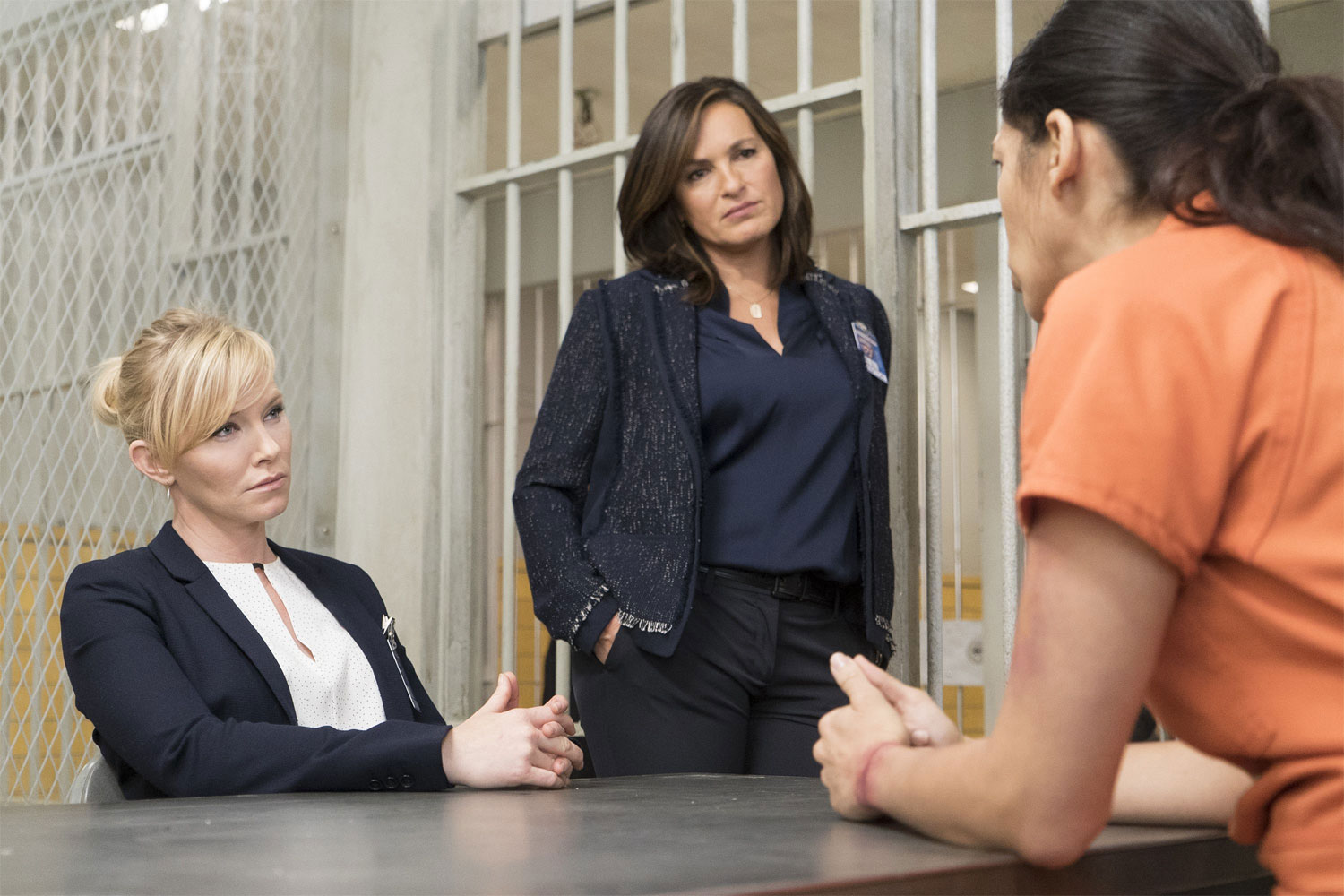
Alexandra Rollins (Kelli Giddish) and Olivia Benson (Mariska Hargitay) talk to a perp.
JMC: We also want to show that not all victims are the same. Benson has this quirk where she always pets the victim, patting or stroking them to connect. So, I deliberately wrote an episode where the victim slaps her for that and says, “Don’t touch me!”
Amanda Slater, producer: We’re careful to make sure the actors are comfortable, too. Every time there’s an actor that is going to portray a victim—when you’re seeing what happens to them, not after the fact—the director and I will make sure everybody’s comfortable with everything we’re doing, even though it’s just pretend. I usually try to have that conversation privately so they don’t need to feel embarrassed.
Behind the Camera
MH: “911”—the [Emmy-winning Season 7 episode where a young sex trafficking victim locked in a room calls the police for help]—challenged me in so many ways, and it was exciting to be called to do that kind of role. Most people don’t realize that the little girl actress wasn’t on set when we shot. A 45-year-old woman read her lines. Most of the episode was me, the director, and a telephone. I was grateful whenever I had another actor in the scene. Not a normal thing an actor says! After doing that episode, I just remember feeling so confident.
TT: We’ve had some good times in the morgue. Warner got shot in the there in Season 11, and it’s always fun to get shot for pretend. Olivia had to perform emergency surgery on me—we’re looking into each other’s eyes, like, I could die if you don’t do this. They put a prosthetic on my torso, and rigged it so when Mariska struck it with the scalpel, the blood kind of popped out.
IG: The episode “Paternity” is the most fun I’ve ever had acting. Olivia and Kathy get into a car crash and Kathy goes into labor. They had to really crash the car—we were standing on a corner in Harlem, watching it and clutching each other. They cleaned out all the glass with this huge vacuum cleaner, then dumped in rubber glass. That’s when Mariska and I became really close—we crawled into this crumpled-up car for four days and shot these intense scenes. We fell completely in love.
SM: At one point, we found out that some fans wanted Benson and Cabot to hook up. We loved it! We started begging the writers for a scene that made it look like we were going to kiss. They were having none of it.
The Guest Stars
Hoda Kotb: When I was going through cancer treatments, I remember the doctor telling me, “You need to heal.” And I thought, “Is healing sitting at home and watching Law and Order? Because that’s really what I’m doing.” So, when SVU called and said, “Do you want to do a part?” I was like, “Are you joking? Am I Dead Body #1?!” I wound up playing myself, but I promise you, if I were Lady #1 walking past Mariska Hargitay on the street while Olivia Benson was on the phone, I would have done that, too.

Benson leads the team into a tense hostage situation.
Ellen Burstyn: I was very flattered when SVU wrote me the part of Stabler’s mother—nobody had ever written a part just for me before. She was a really interesting woman: she had bipolar disorder, but refused to take medication. I soon learned how common that is, because even though it saves you from terrible depression, it stops the ecstatic highs. I wasn’t surprised when I was nominated for an Emmy for playing her—winning, though, that was a surprise.
IG: I loved when Cynthia Nixon came on the show and held me at knifepoint. I knew Cynthia just from being an actor in New York and from Sex and the City—I’d actually been on that show before I was in Law & Order. She was playing a psychopath, a scientist—I remember being like, “Whoa, this is intense.”
Anika Noni Rose: I played the maid in Season 13’s Dominique Strauss-Kahn episode. It was in the news at the time—I thought it was really interesting that they were covering it so quickly. I read a lot about the case, and watched videos of the real maid, Nafissatou Diallo. I wanted to be respectful of her, particularly at a time when no one was being respectful of her.
Helen Shaver, director: We did one with Jennifer Love Hewitt, “Behave,” where after she’d been raped, Benson takes her to get a rape kit done. We go through a montage, a very emotional, wrenching montage, of her experience. She gave such a great performance, and you could really feel the damage of the abuse in those scenes.
Brooke Shields, Sheila Porter (grandmother to Olivia's adopted son, Noah): Mariska came to me and said, “I have an unbelievable idea. There’s this arc coming up, and it’s gotta be someone who’s my age. We go toe-to-toe.” I thought I’d be a senator, a cop, a district attorney. I get the call from my agent: “You’ve been asked to be on an arc for SVU...and oh, by the way, it’s for a grandma.” I called Mariska, like, “Thanks a lot!”
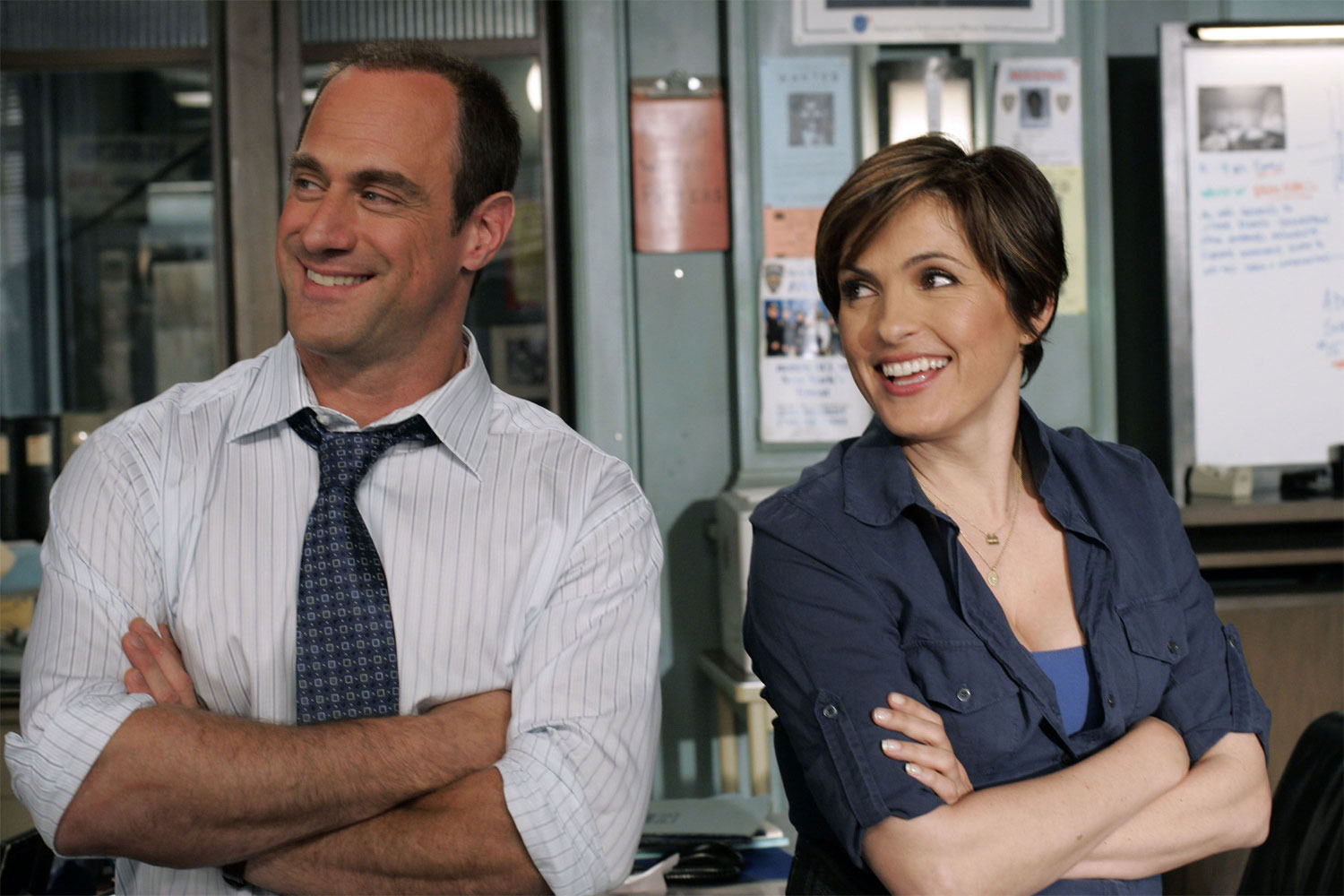
Fans loved the partnership of Elliot Stabler (Christopher Meloni) and Benson for the show's first 12 seasons.
MH: She’s one of my closest friends! I know it sounds crazy, because our scenes are really intense, but off-camera, all we did was laugh.
BS: Our final fight scene was very physical. We had a safe word, a tap—thank God we didn't have to use it. During the last take, I messed up a line. It came out like, “I’ve been shooting a gun since I was two years old.” We both immediately pictured a little baby wheeling around a gun—we were exhausted and we literally collapsed on the ground laughing.
When Meloni Left
MH: I was so sad. So stressed. It was the end of an era. I tried to convince him not to go.
KS: It was the biggest change in the show’s entire run. We were so concerned. We weren’t sure that SVU could survive without him.
JMC: It was really tough. I thought they weren’t accounting for how important he was in terms of Benson’s character.
IG: I found out he was leaving on the internet—and if Chris wasn’t there, I wasn’t there. It’s OK. As much as I loved our family, he was the star. Still, sometimes I feel like Kathy didn’t really get a chance to be a whole person. Sometimes I made up stuff in my head to fill her out. I always hoped people were pulling for her, but I never really knew.
TT: The leadership changed on the show at that point, too, and it became less focused on the science and the forensics. So, Warner wasn’t needed as much.
KS: They brought new characters onto the show, including [detective Amanda] Rollins: another female detective, another working woman.
Kelli Giddish, detective Amanda Rollins: I knew the new head writer, Warren Leight, from a playwriting workshop that I’d done in Indiana. He thought of me, so I came in to read, and it just felt right. The only thing was, the character he’d originally drawn out was from Pennsylvania or something. So, when I got the role, he said, “Okay, we’re going to switch this to Georgia,” where I’m from. It’s nice to be able to play a Southern woman—we’ve got very strong women.
MH: Warren wrote us to be a little adversarial at first. We had to build and earn this incredible friendship.
KG: I love that the writers never forced a relationship between Rollins and Benson like, “OK, you’re besties now, just because you’re two women.”
MH: But seven years later, the leadership on the show is badass women who couldn’t survive without each other.
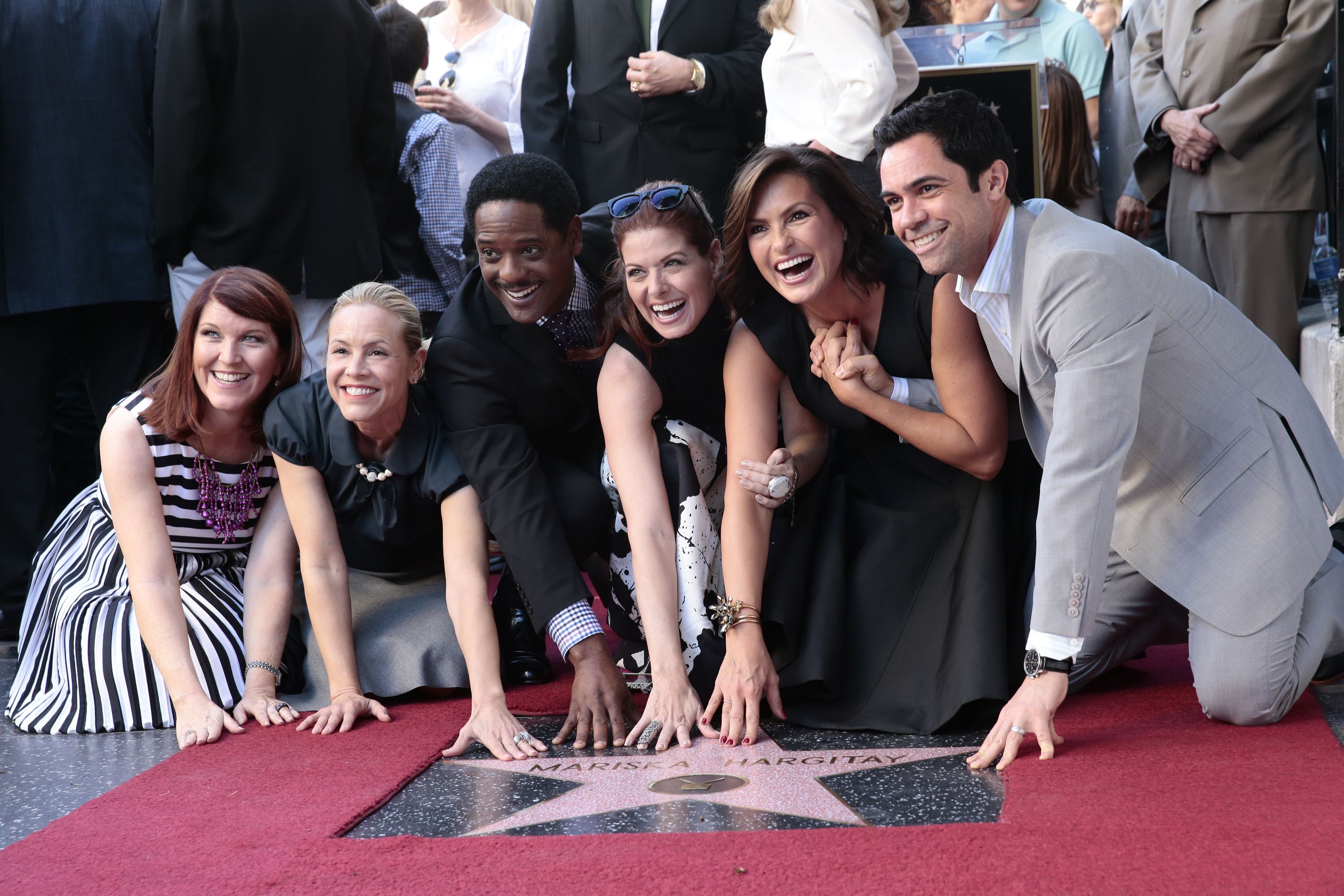
Hargitay and her colleagues celebrate her Walk of Fame star.
KG: Outside of work, too. My husband was paralyzed from Guillain-Barré syndrome, and was in the hospital for two-and-a-half months—and Mariska, in full support mode, sent a piñata the size of half the hospital room. We could only fit one nurse in the room anyway, and now we’ve got this eight-foot piñata. But it made my husband really happy, so by God, it was staying in there!
The Age of Olivia
KS: After Meloni left, what I noticed more and more was the difference in Mariska.
JM: It really became her show—Benson’s show.
AS: Mariska is also remarkable [in her new role as a director]. She’ll be in a scene performing as Benson in an episode she’s directing, and I know that she’s not happy with the performance, but she never shows it. She gets through the entire scene as Olivia Benson, never gives away what’s going on in her head, and gives all of her notes at the end of the take.
MH: Chris leaving truly turned out to be such a lesson of how when one door closes, another door opens. Things really started to change for my character during the William Lewis story arc. [In Seasons 14 and 15, which aired in 2013 and 2014, Pablo Schreiber plays Lewis, a sociopath who abducts Benson.] That’s when you learn about Benson’s psychology, what she’s made of. The scenes were painful to shoot—scary, uncharted territory, and so raw—but I felt such an incredible responsibility to go there and tell that story. I wanted to show the ugliness, fear, and inhumanity, but also what survival is, what inner strength is, our resourcefulness, what we’re capable of, and what we will do to survive. I know a lot of people can’t watch those episodes, and even for me, every time I go back, I’m like, Wow.Because you have to shut off a part of yourself to tell these stories.
KS: Those were some of my favorite shows to cut. They’re so intense. There’s a scene after Lewis abducts her, where Benson cuts her hair. Mariska actually did it—cut her hair for real—so they couldn’t do take after take. We created something with these short little bursts to express Benson’s inner life: all the horror and terror and guilt.
JM: It was a risk to show her in such a vulnerable state. It was traumatizing for a lot of viewers. We kept asking, “Are we going too far? Are we jumping the shark?” But those episodes turned out amazingly, and by the end of it, Benson was a different character. She had separated herself from her partnership with Stabler and become this strong, independent woman.
Thanks to SVU
MH: Instead of hearing, “Hey, I love your show, can I get an autographed picture?” I started receiving a different kind of fan mail, which was women disclosing their stories of abuse. I didn’t know what to do or how to respond, so that’s when I started educating myself. I kept hearing, “I’m just so alone.” And I thought, These people are writing to me? An actor on television? Then this is something we need to start talking about, and I have this platform, so what can I do? That’s when I started the Joyful Heart Foundation [dedicated to empowering survivors of sexual assault, domestic violence, and child abuse], because we need to change the way society responds. Then, last year, I shot a documentary, I Am Evidence, about America’s rape kit backlog. My head exploded when I learned about that. It was the perfect microcosm for how we regard these crimes: What does that say about sexual assault, and what does that say about the value of women?
JMC: Now it guts me how much the storylines relied on rape kits in the beginning.
JM: Still, I think the show is very spirit affirming. Yes, these terrible things happen, but we are going to dramatize how there’s hope at the end—something for the justice system and the police system to aspire to, something to empower women.
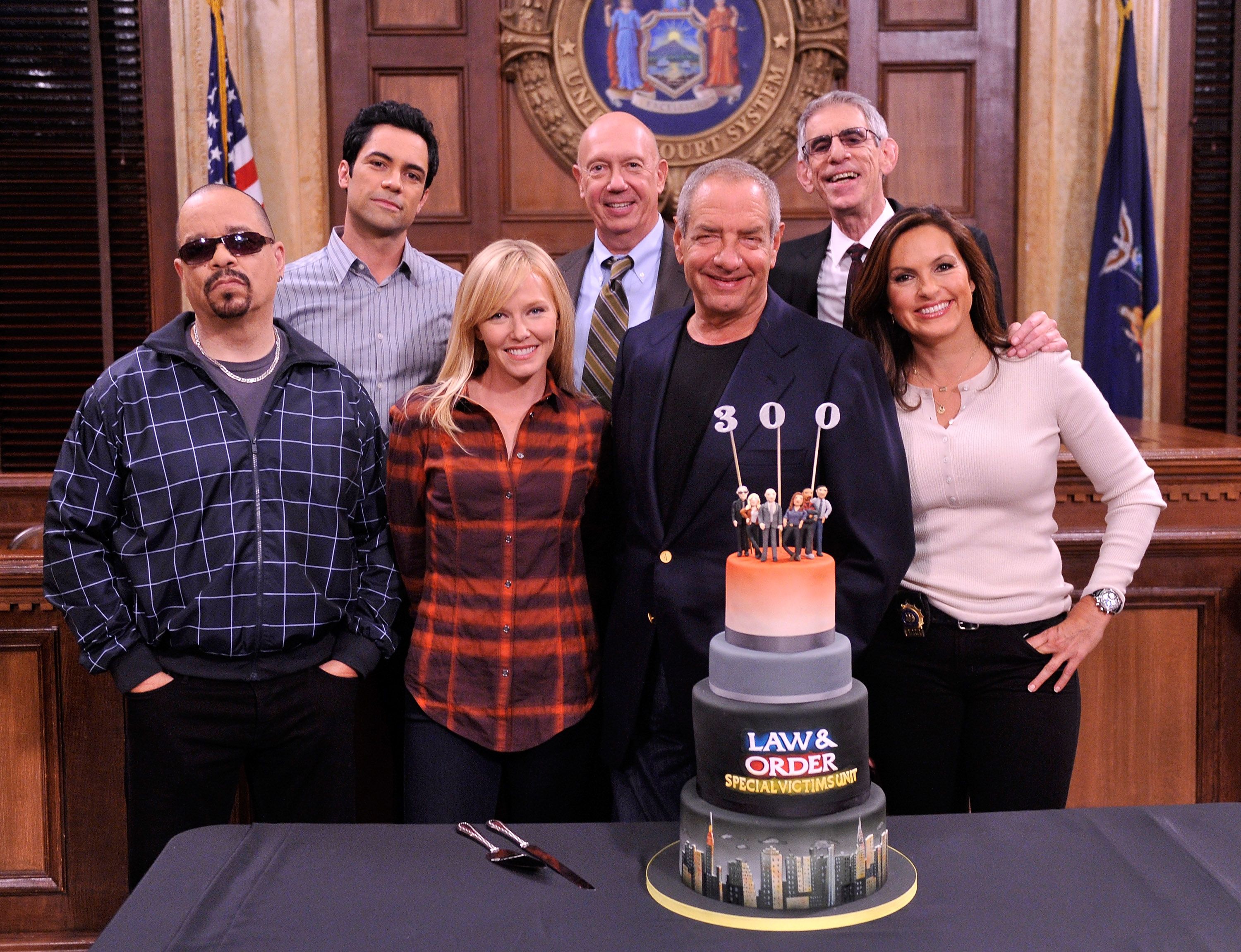
The cast celebrates its 300th episode.
TT: Women of color, mothers, come up to me and say, “My daughter is going to college for forensic science because of your character.” It’s very moving, and something I take great pride in.
HS: It hasn’t been as avant-garde as the #MeToo movement, but I think SVU’s evolution over time reflects our changing understanding of sexual assault. Really, it’s educated a lot of people.
SM: It’s shone a light on a very dark part of our culture. Over the years, so many people have told me how the show galvanized them to seek help.
MH: I think our culture is indeed changing. We have lots of work to do, but I know we can fix it. It’s a pleasure to watch our writers change with the times and educate themselves on these issues; they’re really keeping up on the evolving attitudes. I think SVUmakes people feel safe, like somebody gets it. I’m in a deeply unique and lucky position to be the constant on this progressive, forward-thinking show—to have everybody come and play with me in my playground.